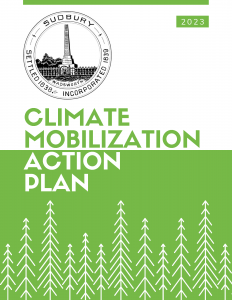The Roadmap to Climate Resilience
 Highlights of the Roadmap to Climate Resilience:
Highlights of the Roadmap to Climate Resilience:
- At the 2022 Annual Town Meeting, Sudbury passed the Article 58 Climate Emergency Declaration, mandating that the Town hire a full-time staff member dedicated to sustainability and create a Climate Mobilization Action Plan.
- Sudbury’s First Edition of the Climate Mobilization Action Plan (CMAP) has been finalized and can be viewed here: Climate Mobilization Action Plan
- Key focus areas of the CMAP include Energy, Resilience, Governance, Water, Mobility, Waste, Facilities and Buildings, and Natural Resources. Each focus area includes Stage 1, Stage 2, and Stage 3 action strategies.
- Within the next year, the CMAP will be updated with data collected from the Greenhouse Gas (GHG) Emissions Inventory.
Global climate change poses an existential threat to human society and the ecosystems upon which we depend. Risks of global warming include increased frequency and duration of severe storms, extreme heat, drought, and sea level rise. In Sudbury, these risks have already been felt. Over the past few years, Sudbury residents have experienced more frequent and intense storms that have resulted in downed trees, loss of power, and localized flooding, as well as periods of drought and extreme heat resulting in water bans and increases in heat related illnesses. The Town has been actively working to advance climate action and combat these risks for more than thirty years. This climate action came to the forefront in 2022. At the 2022 Annual Town Meeting, the residents of Sudbury passed Article 58 which declared a climate emergency. This Climate Emergency Declaration mandated that the Town hire a full-time staff member dedicated to sustainability and create a Climate Mobilization Action Plan. The Climate Mobilization Action Plan (CMAP) serves as a strategy toolkit to prepare for the potential changes in the environment, both natural and economic, that may occur. The Town of Sudbury is pleased to announce that the first edition of the Climate Mobilization Action Plan has been completed.
The Town utilized the assistance of Andrew Blair, a Harvard Graduate student, in putting together this action plan. Mr. Blair was receiving his Master of Liberal Arts in Sustainability from the Harvard Extension School, and needed to identify a capstone project at the same time that Sudbury declared it’s Climate Emergency. He reached out to the Town in July 2022 and was connected with Sandra Duran, Sudbury’s Combined Facilities Coordinator, to work on this effort. In August 2022, data collection for the CMAP began. Collecting data for the CMAP was a mining process that included accessing data from previous Town plans and interviewing various stakeholders. Communication and collaboration with a variety of stakeholders was paramount as changes in the climate will have impacts across all sectors. The many stakeholders interviewed during this process included primary stakeholders such as the Facilities Department, Energy and Sustainability Committee, Department of Public Works, Planning and Community Development Department, Town Manager’s Office, Select Board, Sustainable Sudbury, and the Conservation Department. Additional stakeholders included Town committees such as the Commission on Disability, Conservation Commissions, Finance Committee, Planning Board, and Transportation Committee, Town departments such as the Building Department, Department of Health, Fire Department, and Sudbury Senior Center, intra-governmental Town stakeholders such as the Lincoln-Sudbury Regional High School and Sudbury Water District, and many regional stakeholders.
As a result of this data collection and these stakeholder interviews, Mr. Blair was able to establish a plan that gives a holistic view of how the Town of Sudbury can achieve a sustainable future. To achieve this sustainable future, the CMAP includes a menu of strategies, tactics, and policies for Sudbury’s residents, businesses, and municipal government to reduce their share of greenhouse gas emissions and sequester greenhouse gasses. Additionally, the CMAP also includes planning for community outreach, engagement, and education to facilitate implementation, as well as planning to ensure that the costs of the required mobilization do not unfairly burden those economically or socially disadvantaged. The strategic focus areas of this plan are Energy, Resilience, Governance, Water, Mobility, Waste, Facilities and Buildings, and Natural Resources. Each of these focus areas have a set of strategies organized into Stage 1 (High Climate Impact/Low Barriers to Implementation), Stage 2 (Medium to High Climate Impact/Medium Barriers to Implementation), or Stage 3 (Low to Medium Climate Impact/High Barriers to Implementation) actions, creating a roadmap for the execution of the initiatives outlined in this plan.
It is important to note that while this CMAP will provide a valuable roadmap for climate action moving forward, this is a first edition of that plan and it will be updated on a periodic basis as conditions and priorities change. Over the coming months, the Town of Sudbury will be conducting a Greenhouse Gas (GHG) Emissions Inventory to set a baseline of the current community GHG emissions and target reduction goals for the future. When that inventory is completed, the data collected will be utilized to create a second edition of this CMAP, likely with additional strategies for consideration.
The Town of Sudbury thanks Andrew Blair for his tireless effort in creating this critical plan. Additionally, the Town of Sudbury would also like to thank the many stakeholders who were involved in this planning process. The input of these many stakeholders and Mr. Blair’s determination have resulted in this urgent sustainability guide that will be utilized by the Town for years to come.
If you would like to learn more about Sudbury’s Climate Mobilization Action Plan, or how the Town intends to implement these actions, please feel free to reach out the Dani Marini-King, Sudbury’s Sustainability Coordinator, by email at marinid@sudbury.ma.us.
